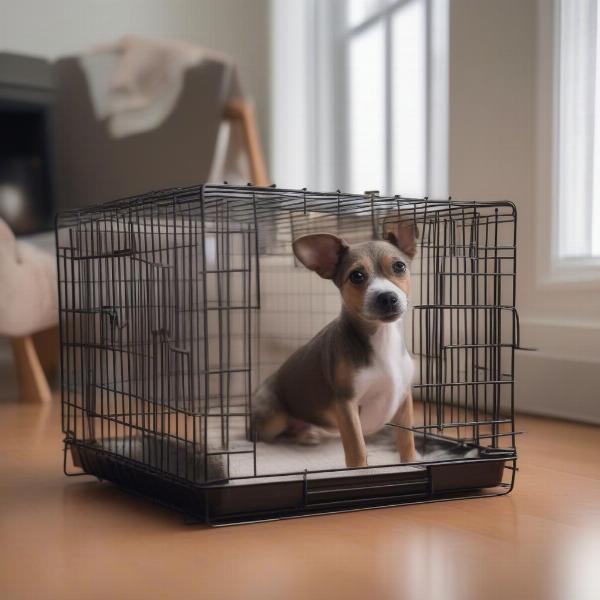Your furry friend’s incessant barking in their crate can be frustrating and concerning. Whether they’re a new puppy or an older dog, understanding why they bark and implementing effective strategies is key to a peaceful home for both of you. This article will explore the common reasons behind crate barking and provide practical solutions to help your dog settle down and feel comfortable in their den.
Why is My Dog Barking in Their Crate?
Several factors can contribute to a dog’s crate barking. Identifying the root cause is the first step towards resolving the issue. Is your dog a new addition to the family? They might be experiencing separation anxiety or simply adjusting to the confinement. Perhaps they need a potty break, are feeling bored or lonely, or haven’t had enough exercise. Even medical reasons could be at play.
 Dog Barking in Crate Due to Anxiety
Dog Barking in Crate Due to Anxiety
Addressing Separation Anxiety and Crate Training Issues
Separation anxiety is a common cause of crate barking. If your dog becomes distressed when left alone, gradually acclimate them to the crate by associating it with positive experiences. Start with short periods of confinement, rewarding calm behavior with treats and praise. Increase the duration gradually, ensuring your dog feels safe and secure. A comfortable bed, familiar toys, and a blanket with your scent can help ease their anxiety.
Ensuring Your Dog’s Needs Are Met
Sometimes, the simplest explanations are the most accurate. Your dog might be barking because they need a potty break, are thirsty, or hungry. Establish a regular feeding and potty schedule, ensuring their needs are met before crating them. Provide fresh water in a spill-proof bowl inside the crate.
Preventing Boredom and Providing Enrichment
A bored dog is a barking dog. Ensure your dog has had enough physical and mental stimulation before crating them. A long walk, a game of fetch, or a puzzle toy can help tire them out and reduce the likelihood of barking. Provide engaging toys and chews inside the crate to keep them occupied and entertained.
Ruling Out Medical Reasons
If your dog’s barking is sudden or unusual, consider potential medical issues. Pain, discomfort, or underlying health conditions can cause changes in behavior. Consult your veterinarian to rule out any medical reasons for the barking.
When to Seek Professional Help
If you’ve tried various strategies and your dog’s barking persists, consider seeking professional help from a certified dog trainer or behaviorist. They can assess your dog’s specific situation and develop a tailored training plan to address the underlying causes of the barking.
Conclusion
Addressing your dog’s crate barking requires patience, consistency, and a thorough understanding of their needs. By addressing potential causes such as separation anxiety, boredom, and unmet needs, and seeking professional guidance when necessary, you can help your dog feel safe, comfortable, and quiet in their crate. This will lead to a happier, more peaceful environment for both of you. Remember, a calm crate is a happy crate!
FAQ
- How long can I leave my dog in their crate? This depends on your dog’s age, breed, and individual needs. Puppies generally require more frequent breaks than adult dogs.
- What type of crate is best for a barking dog? A secure and well-ventilated crate is essential, regardless of barking issues. The type of crate (wire, plastic, etc.) depends on your dog’s individual preferences.
- Should I ignore my dog’s barking in the crate? Ignoring the barking can sometimes reinforce the behavior. It’s crucial to address the underlying cause of the barking.
- Can I use a bark collar to stop my dog from barking in the crate? Bark collars can be aversive and may exacerbate anxiety. It’s best to explore positive reinforcement methods first.
- Is it cruel to crate train a dog? Crate training, when done correctly, can provide a safe and secure den for your dog. It’s not inherently cruel.
- What if my dog continues to bark despite my efforts? If the barking persists, consult a certified dog trainer or behaviorist for professional guidance.
- My dog barks when I put them in the crate at night. What should I do? Ensure their needs are met before bedtime and create a relaxing bedtime routine.
Related Articles
About ILM Dog
ILM Dog (ilmdog.com) is your trusted international resource for expert dog care and training advice. We offer a comprehensive range of guidance, from breed selection and healthcare to nutrition and behavior, empowering dog owners worldwide to provide the best possible care for their furry companions. Whether you are a seasoned dog owner or just starting your journey, ILM Dog has the resources to support you. Contact us for personalized advice: email us at [email protected] or call us at +44 20-3965-8624.